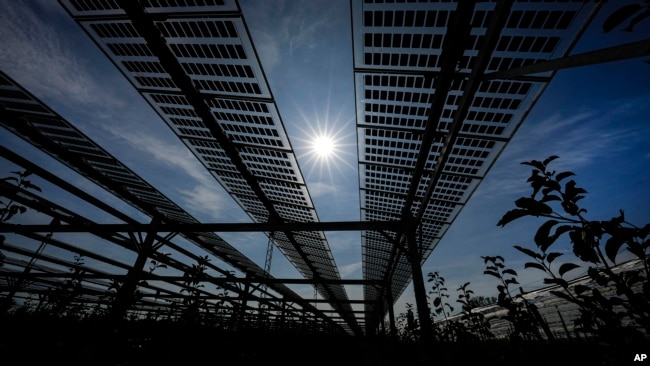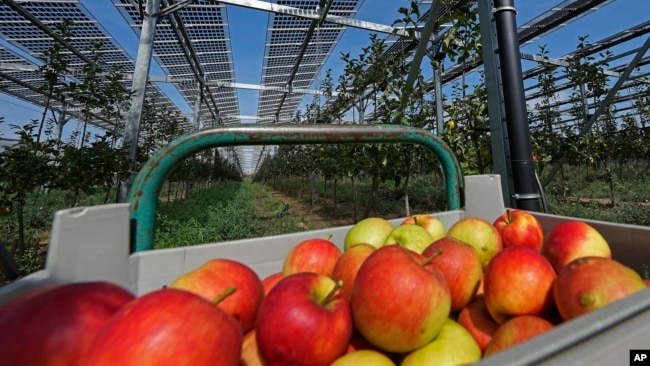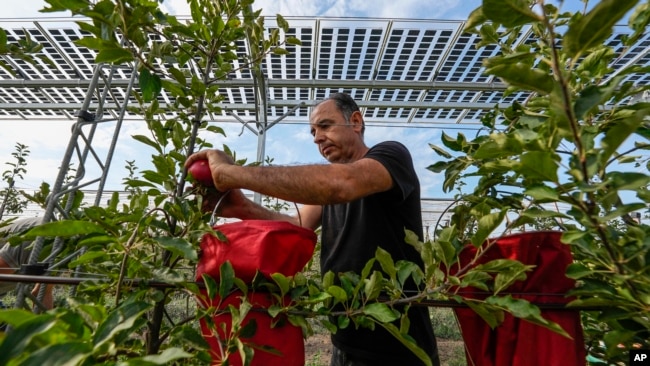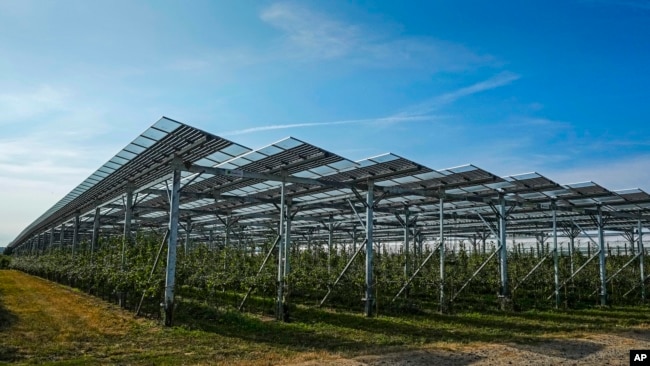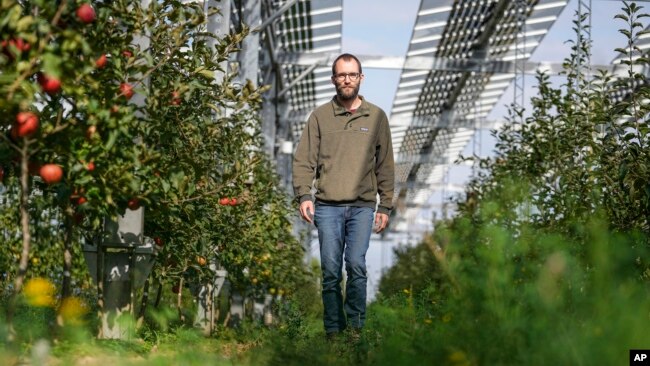果樹園が紹介されていますが、多くの作物に応用されるといいですね。
適した品種と適切な育成方法には時間も苦労も要することでしょう。
でも、自給率をあげることが国を存続させる鍵となる今、その努力は必要ではないでしょうか!!
VOAで英語を学びましょう!!
[: contents]
ドイツの農家が太陽光発電装置で果実を栽培(和訳)
German Farmer Grows Fruit under Solar Power Equipment
September 11,2022
ドイツの農家が、太陽光発電装置の下でリンゴを栽培し、電気を作ることに成功しています。
ドイツ西部の町ゲルスドルフでリンゴ農園、果樹園、を営むクリスチャン・ナハトヴァイさんは、現在、収穫の季節を迎えています。このほどAP通信社の記者が店舗への出荷を控えた赤いリンゴElstarを積み込む作業を行っていたナハトヴァイさんを訪れました。
りんごに加えて、ナハトウェイの農場は、第二の収穫である電気も生産しています。農園の木の多くはソーラーパネルの下で育っており、今年の夏は例年になく晴天が続いたため、ソーラーパネルが発電しています。電力供給だけでなく、日陰で果実を保護する役割も果たしています。
ナハトウェイさんは、この農園のアイデアはシンプルだと言います。生育面積を減らすことなく、木が日光に当たりすぎるのを防ぐ設計になっています。「On top of that,その上(それに加えて)、同じ土地で太陽光発電を行います。」とナハトウェイさんは言います。
欧米では、農作物と同じ土地に太陽光発電装置を設置することが一般的になりつつあります。農家は、このモデルによって土地を最大限に活用し、第二の収入を得る方法を確立することができることを見つけています。
しかし、作物と太陽光を適切に組み合わせることは難しいのです。ほとんどの果物は、特定の栽培条件を必要とします。小さな環境の変化でも、作物にダメージを与え、経済的な損失をもたらす可能性があります。また、たとえ実がなっても、色が悪かったり、甘みが少なかったりして、売るのが難しい場合もあります。
そこでナハトウェイさんは、研究者と協力して、どのようなリンゴがソーラーカバーの下でうまく育つかをテストしています。また、どのようなソーラーパネルが果樹園に最適かも調査しています。ナハトウェイさんの果樹園では、試験的に伝統的なネットでリンゴの木を覆ってみました。通常、天候による被害から繊細な作物を守るために使用されます。
ユルゲン・ジマーさんは、同地区の農業サービス部門の専門家です。彼はAP通信に、ソーラーカバーの下で栽培された今年のリンゴは、ネットの下のリンゴより少し甘みが少なかったと語ります。しかし、7月24日にこの地域を襲った強烈な日差しで、太陽熱遮蔽のリンゴが傷んだことはほとんどありませんでした。日除けなしのグループでは、約18%のリンゴが日焼けによるダメージを受けたとジマーさん言います。
「起こりうるすべての気象条件を記録するには、少なくとも2〜3年の期間が必要です」とジマーさんは付け加えます。ジマーさんとナハトウェイさんは、作物の生産量やソーラーカバーが果実の色に与える影響も調べる必要があります。
研究者たちは、このテストによって、果実作物がソーラーパネル下でうまく機能することが示されることを期待しています。これは、再生可能エネルギー生産が貴重な農地と競合するのを防ぐのに役立つことでしょう。気候変動や食料価格の上昇と戦うために再生可能エネルギーの必要性が高まるにつれ、この競合はますます懸念されるようになります。
ナハトウィーさんは、この農場で生産された太陽光発電の電力を、自分の建物や機械の電力として使うことも可能だと言います。しかし、今のところ、彼は周辺地域の家庭に電気を供給する予定です。
German Farmer Grows Fruit under Solar Power Equipment
A German farmer is successfully growing apples beneath solar power equipment that produces electricity.
It is currently harvest season for Christian Nachtwey, who operates an apple farm, or orchard, in the western German town of Gelsdorf. A reporter from The Associated Press recently visited Nachtwey as workers loaded up red Elstar apples ready to be shipped to stores.
In addition to apples, Nachtwey's farm also produces a second harvest: electricity. Many of the farm’s trees grow beneath solar panels that have been producing power during this year's unusually sunny summer. In addition to providing electricity, the panels protect the fruit below with shade.
Nachtwey said the idea behind the farm is simple. The design protects the trees from getting too much sun without reducing the available growing area. “On top of that, there's the solar electricity being generated on the same land,” Nachtwey said.
Putting solar equipment on the same land as crops is becoming increasingly popular in Europe and North America. Farmers are finding that this model can make the most of their land, while establishing a second way to earn money.
But getting the right mix of crop and solar is difficult. Most fruit requires specific growing conditions. Even small changes in the environment can harm crops and cause financial losses. Even if the fruit survives, it might turn the wrong color or be less sweet and may be difficult to sell.
For this reason, Nachtwey is working with researchers to test which kinds of apples do well under a solar cover. He is also investigating which kinds of solar panels work best in the orchard. For testing purposes, Nachtwey covered some of his trees with a traditional netting material. It is normally used to protect sensitive crops from damaging weather events.
Juergen Zimmer is an expert with the area’s agricultural services department. He told the AP that apples grown under the solar covers were a little less sweet this year than those under the nets. But almost no solar-shaded apples got damaged in the intense sunlight that hit the area on July 24. In the non-shaded group, about 18 percent of apples suffered sun damage that day, Zimmer said.
“We need at least two to three full years to record all the weather conditions that might occur,” he added. Zimmer and Nachtwey will also need to look at crop production levels and how the solar covers affect fruit color.
Researchers hope the tests will show that fruit crops perform well under solar panels. This could help prevent renewable energy production from competing for valuable agricultural land. That competition has become an increasing concern as the need for renewable energy increases to fight climate change and rising food prices.
Nachtwey said he could use the solar electricity produced on the farm to power his own buildings and machines. But for now, he plans to provide electricity to homes in the surrounding area.
Words in This Story
solar panel – n. a large, flat piece of equipment that uses the sun's light or heat to create electricity
shade – n. an area of slight darkness that is produced when something blocks the light of the sun
generate – v. to produce
net – n. a material made of crossed threads with holes between them
renewable – adj. any naturally occurring kind of energy, such as sunlight or wind
